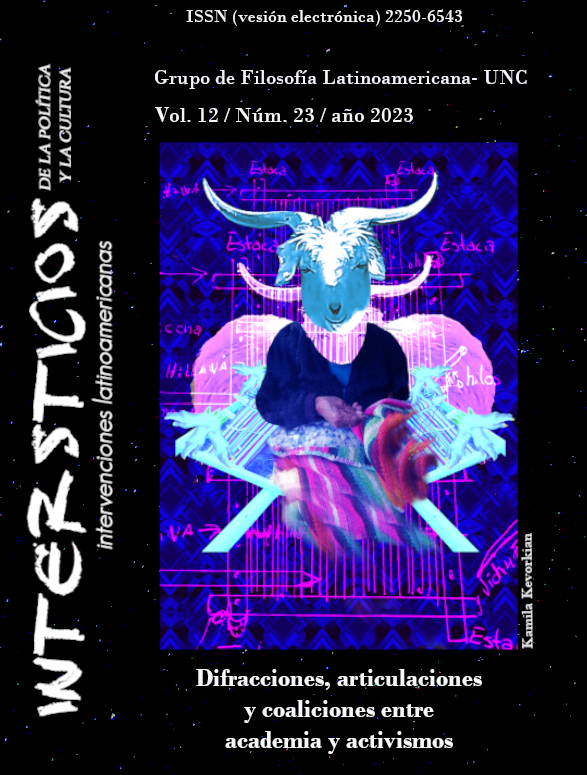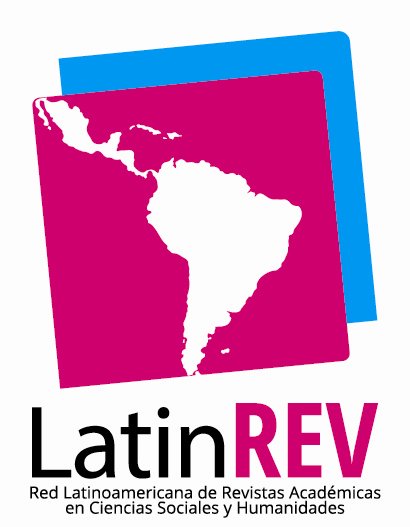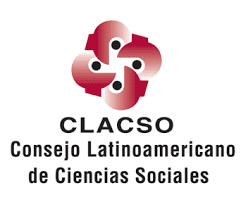The inaudible voices of violence: Contributions from the critical epistemology to analyzing the construction of punished masculinities
Keywords:
Epistemological Criticism, Violence, Gender, MasculinitiesAbstract
This work aims to gather theoretical contributions from the critical epistemology in the way of thinking about violence present in social relationships. Introducing the different actors envolved in my field of study, I attempt to elucidate which forms of knowledge production underlie the judicialization of conflicts, by watching what are the terms elaborated in this contexts linked to, and how this words are used by the people who inhabbit this web of relationships. At this point, I`ll focus on the speeches of the state punitive institutions in Río Negro province, as well as those of the people to whom the security policies are intended. At the same time, I propose a reflective work questioning the roles I play in this dynamic. The epistemological question tends to strengthen new channels for boarding punished masculinities, which is the objetive that guides my research concerns. For this purpose, I beggin by considering gender as a way of ordering social practice, which is as well engaged with other differential axes. Therefore, thinking about punished masculinities requires to take into an account the sexual difference, but also those signed by the social class, etnicity and age, among other factors. In Bariloche, this framework has a particular shape that is linked to social and historical processes that I give importance to, in order to understand the way in which social relations are structured nowadays. In this context, I understand that this intersections generate types of knowledge construction that traverse our way of elaborating and exchanging knowledges. Based on different theorical productions, I attempt to deepen in the patriarchial and androcentric logic present in the cientific and legal language that, pretending to be neutral, operates hiding the power relationships that hold such knowledge exchange.
Downloads
References
Bermúdez Peña, Claudia (2011). Intervención social desde el Trabajo Social: un campo de fuerzas en pugna. PROSPECTIVA. Revista de Trabajo Social e intervención social, nro. 16, 83-101. Recuperado de https://www.redalyc.org/pdf/5742/574261388005.pdf
Bermúdez Peña, Claudia (2010). Intervención social y organizaciones comunitarias en Cali. PROSPECTIVA. Revista de Trabajo Social e intervención social, nro. 15, 49-68. Recuperado de https://www.redalyc.org/pdf/5742/574261389002.pdf
Briones, Claudia (2014). Navegando creativamente los mares del disenso para hacer otros compromisos epistemológicos y ontológicos. Cuadernos de Antropología Social, nro. 40, 49-70. Recuperado de http://www.scielo.org.ar/scielo.php?pid=S1850-275X2014000200003&script=sci_arttext&tlng=en
Cañuqueo, Lorena, Kropff, Laura, Pérez, Pilar, & Wallace, Julieta. (Comps.) (2019). La tierra de los otros. La dimensión territorial del genocidio indígena en Río Negro y sus efectos en el presente. Viedma: UNRN.
Connell, R. W. (2005), Masculinities (2ª ed.), Cambridge, Polity.
Cucco, Mirtha. y Saenz, Ana. (2013). Escuela para madres y padres. Una propuesta de transformación social. Nuevos Escritores.
Cucco, Mirtha, Losada Cucco, Ayelén, Camardon Ciafardini, Lucía. (2022). Masculinidad hegemónica y violencia. Guía metodológica para el desarrollo del Programa ProCC de intervención comunitaria con varones involucrados en causas judiciales por violencia de género.Asociación de Trabajadores y Trabajadoras en Salud para la Comunidad “Marie Langer”. Sevilla, España.
Delrio, Walter. Escolar, Diego. Lenton, Diana. y Malvesttiti, Marisa. (Eds.). 2018. En el país de nomeacuerdo: archivos y memorias del genocidio del Estado argentino sobre los pueblos originarios, 1870-1950. Río Negro: UNRN.
Foucault, Michael (2007[1999]). Los anormales. Curso en el Collage de France (1974-1975). Fondo de Cultura Económica. Buenos Aires.
Fricker, Miranda (2017). “Injusticia testimonial” e “Injusticia hermenéutica”. En Injusticia epistémica. Barcelona: Herder Editorial, 29-60 y 237-279.
Haraway, Donna ([1991] 1995). “Conocimientos situados: la cuestión científica en el feminismo y el privilegio de la perspectiva parcial”. En Ciencia, cyborgs y mujeres. La reinvención de la naturaleza. Madrid: Cátedra, 313-346.
Instituto de Asitencia a Presos y Liberados (2021). Informe anual. Recuperado de https://seguridad.rionegro.gov.ar/?contID=69274
Kuhn, Thomas (1993[1962]). La Estructura de las Revoluciones Científicas. Fondo de Cultura Económica. México.Lamas, Marta. (ed.) (2000): El Género. La Construcción Cultural de la Diferencia Sexual. México: Grupo Editorial Miguel Ángel Porrúa.
Legislatura de la Provincia de Río Negro (15 de diciembre de 1989). Ley nro. K2343. Creación del Instituto de Asistencia a Presos y Liberados de la Provincia de Río Negro. Recuperado de https://web.legisrn.gov.ar/digesto/normas/ver?id=1990010025
Maffía, Diana y Danila Suárez Tomé (2021). “Epistemología feminista”. En Gamba, Susana y Tania Diz (Coord.) Nuevo diccionario de estudios de género y feminismos. Buenos Aires: EUDEBA.
Medina, José (2021). “Injusticia epistémica y activismo epistémico en las protestas sociales feministas”. Revista Latinoamericana de Filosofía Política, 10, 8, 227-250. Recuperado de http://rlfp.org.ar/revista/index.php/RLFP/article/view/127
Radi, Blas y Pérezm Moira (2018). Injusticia epistémica en el ámbito de la salud: perspectivas desde la epistemología social. Avatares Filosóficos, núm. 5, 117-130. Recuperado de http://revistas.filo.uba.ar/index.php/avatares/article/viewFile/3419/2314
Ramos Mesa, Amalín (2021) Protocolos institucionales ante la violencia de género. ¿Mecanismos alternativos de justicia o nuevos dispositivos de control social? En Victoria Fraga Utges, y Gisela Santangelo, (comp.), Violencias sexuales, género y sistema penal. Miradas actuales sobre problemas estructurales, Editores del Sur.
Roseberry, William. 1994. “Hegemony and the Language of Contention”. En J. Gilbert y D. Nugent (eds.). Everyday Forms of State Formation. Revolution and the Negotiation of Rule in Modern Mexico. Durham and London: Duke University Press. 355-366.
Rufer, Mario (2012). “El habla, la escucha y la escritura: subalternidad y horizontalidad desde la crítica poscolonial”. En Corona, Sarah y Olaf Kaltmeier (Eds.) En diálogo. Metodologías Horizontales en Ciencias Sociales. México: Gedisa, 55-82.
Segato, Rita Laura (2003). Las estructuras elementales de la violencia: contrato y status en la etiología de la violencia (No. 334). Universidade de Brasília, Departamento de Antropologia.
Trebisacce, Catalina (2016). Una historia crítica del concepto de experiencia de la epistemología feminista. Cinta Moebio, núm. 57, pp. 285-295. Recuperado de https://www.scielo.cl/scielo.php?pid=S0717554X2016000300004&script=sci_arttext
Vilatta, Emilia y Giromini, José Gabriel (2021). La injusticia testimonial como fabricación de personas: una lectura ontológica. Griot: Revista de Filosofía, 21 (1), 75-93. Recuperado de https://ri.conicet.gov.ar/handle/11336/178076
Yesuron, Mariela Ruth (2021). Una lectura feminista y antipunitivista de la dicotomía víctima-victimario. Polémicas feministas, núm. 5, 1-21. Recuperado de https://revistas.unc.edu.ar/index.php/polemicasfeminista/article/view/35690
Downloads
Published
How to Cite
Issue
Section
License

This work is licensed under a Creative Commons Attribution-NonCommercial-ShareAlike 4.0 International License.
Authors who have publications with this journal agree to the following terms:
a. Authors will retain their copyright and grant the journal the right of first publication of their work, which will simultaneously be subject to the Creative Commons Attribution License that allows third parties to share the work as long as its author and first publication in this journal are indicated.
b. Authors may adopt other non-exclusive license agreements for distribution of the published version of the work (e.g., deposit it in an institutional telematic archive or publish it in a monographic volume) as long as the initial publication in this journal is indicated.
c. Authors are allowed and encouraged to disseminate their work through the Internet (e.g., in institutional telematic archives or on their web page) after the publication process, which may produce interesting exchanges and increase citations of the published work (see The effect of open access).










